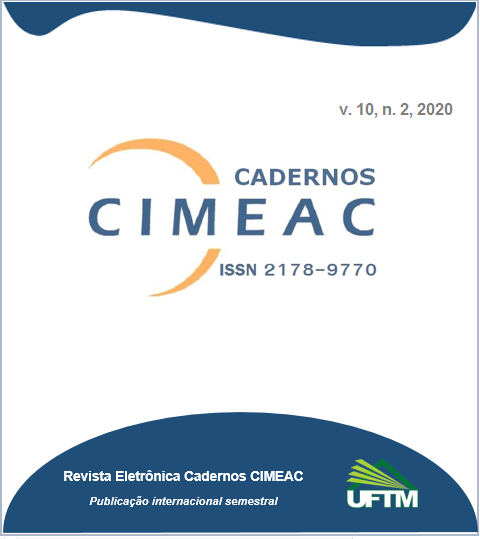Uma educação popular e identitária se distancia do campo
DOI:
https://doi.org/10.18554/cimeac.v10i2.4047Resumo
Este artigo é resultado de uma pesquisa, desenvolvida junto ao Programa Mestrado Profissional em Educação: Formação Docente para a Educação Básica da Universidade de Uberaba, Campus de Uberlândia, Minas Gerais. Objetivou-se compreender como a educação do campo, por meio de sua proposta pedagógica, relaciona-se com os princípios da educação popular, visando a uma formação humana que valorize e respeite os saberes e cultura do campo. O procedimento metodológico adotado foi a pesquisa bibliográfica, documental, observacional e entrevista com profissionais da educação, em cinco escolas rurais, fundamentando-se nos princípios da educação popular apregoados por Freire (2016, 2011), Brandão (2012), Arroyo (2012, 2004), Caldart (1997), que nos auxiliaram para uma reflexão crítica sobre a educação do campo no município de Uberlândia. Os resultados encontrados, analisados por meio da análise de conteúdo e dos dados coletados, levaram-nos a crer que, tanto teoricamente como na prática, a educação do campo e a educação popular se complementam, bem como permitem a formulação de práticas educativas inovadoras, que reconheçam e valorizem os saberes de todos os sujeitos envolvidos no processo educativo. Percebeu-se que a participação da comunidade escolar na elaboração de um Projeto Político Pedagógico mais democrático e inclusivo não tem ocorrido no município. Encontrou-se também, ao contrário do que prevê todo o marco regulatório, desde a União, Estado e Município, a aplicação da mesma grade curricular tanto nas escolas urbanas como nas localizadas no meio rural. As principais justificativas foram relacionadas às características atuais do espaço rural que se assemelham ao meio urbano.
Palavras-chave: Educação do campo; Educação popular; Formação humana.
ABSTRACT: This article is the result of a research, developed in the Professional Master Degree in Education: Teacher Training for Basic Education of the University of Uberaba, Campus of Uberlândia, Minas Gerais State. The objective was to understand how the education of the rural area, through its pedagogical proposal, is related to the principles of popular education, aiming at a human formation which values and respects the knowledge and culture of the peasants. The methodological procedure adopted was the bibliographical, documentary, observational and interview research, based on the principles of popular education preached by Freire (2016, 2011), Brandão (2012), Arroyo (2012, 2004), Caldart (1997), who helped us for a critical reflection on rural education in the city of Uberlândia. The results were analyzed through content analysis and the collected data led us to believe that, both theoretically and in practice, rural education and popular education complement each other, as well as allowing the formulation of innovative educational practices that recognize and value the knowledge of all the subjects involved in the educational process. It was noticed the participation of the school community in the elaboration of a more democratic, inclusive Pedagogical Political Project has not occurred in the municipality. Contrary to what the entire Union, State and Municipality had foreseen, it was verified that all of them used the same curriculum in both urban and rural schools. The main justifications were related to the current characteristics of the rural space that resemble the urban environment.
Keywords: Rural education; Popular education; Human formation.
Downloads
Publicado
Edição
Seção
Licença
Os autores que publicam nesta revista concordam com os seguintes termos:
(a) Não cobramos dos autores para a publicação neste periódico.
(b) Autores mantém os direitos autorais e concedem à revista o direito de primeira publicação, com o trabalho simultaneamente licenciado sob a Licença Creative Commons que permite o compartilhamento do trabalho com reconhecimento da autoria e publicação inicial nesta revista.
(c) Autores têm permissão e são estimulados a difundir e a distribuir a versão publicada de seu trabalho online (ex.: em repositórios institucionais ou na sua página pessoal) após o processo editorial, já que isso pode aumentar o impacto e a citação do trabalho publicado (Veja O Efeito do Acesso Livre).
* * *
AUTHORS COPYRIGHT AND PUBLISHING RIGHTS
Authors who publish with this journal agree to the following terms:
(a) This journal does not charge authors for publication.
(b) Authors retain copyright and grant the journal right of first publication with the work simultaneously licensed under a Creative Commons Attribution License that allows others to share the work with an acknowledgement of the work's authorship and initial publication in this journal.
(c) For authors whose articles have been accepted: authors are permitted and encouraged to post their work online (e.g., in institutional repositories or on their website) after the publication of the text in Cadernos CIMEAC, as it can lead to productive exchanges as well as earlier and greater citation of published work (See The Effect of Open Access).


 10.18554/cimeac
10.18554/cimeac


